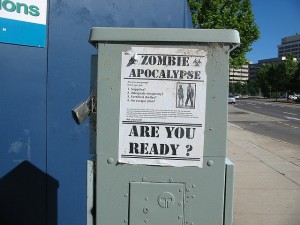Deep in the American psyche is an apocalyptic fear, says Melbourne author and pastor Mark Sayers whose work examines the intersection of Christianity and culture.
 This idea was brought home to Sayers quite accidentally. He explained it to the Australasian Religious Press Association at their annual conference in Canberra on the weekend.
This idea was brought home to Sayers quite accidentally. He explained it to the Australasian Religious Press Association at their annual conference in Canberra on the weekend.
For Sayers, California is a state of mind as well as a physical place. The book by the Melbourne Pastor, The road trip that changed the world examines the rugged individualism of Jack Kerouac and the early Beatniks: these restless drugged-out rovers provide the “mythic potential” of the California story for Sayers.
It has been resonating through youth culture ever since. And Sayers has been talking about it since publishing Road Trip in 2012.
But it was a scary experience for Sayers to be asked to talk about California to real Californians recently.
Sayers made it through the talk. It was in the Q&A that mayhem took over.
A young Californian asked him what is the future for rugged individualism.
His mind went to Melbourne and the Chinese people in his neighbourhood, who he had seen watching TV coverage of a Beijing martial parade.
Throwing his observation into the mix, Sayers said, “I wonder what will happen if we get a mashup of China’s disciplined society and western individualism?”
It was as if Sayers had set off a bomb in the room. As they filed out, person after person asked “how many months do we have until there is war with China?”
The end of the world is never far from the American psyche. Sayers reflects that the US apocalyptic fears show up in their movies as well, films in which either America is on top, zombies take over or disaster happens.
Australians, on the other hand, don’t have the same sort of apocalyptic imagination. We imagine the good times rolling on.
Sayers asks the subtle question: What if Australia’s comfortable assumption is a form of Apocalypse?
“What if you live in a comfortable society [and Sayers takes Denmark as his example] in which everyone has everything they think they want, how can the church be prophetic?”
Sayers examines the hidden injustices behind the Danish facade of beautiful people. It is a society that excludes those who are different, Muslims, and the disabled. A “progressive culture that rigorously excludes the outsider.”
His critique is of a culture obsessed with image, where sex is easier than conversation, hooking up is based on looks not communication.
He calls on Christians to nurture a creative minority within a post Christian society. His church provides young people who want to join with a “detox manual”, detoxing for a weekend from their phones, computer and all social media.
It takes silence, and space to be your real self.
As the church is torn apart, Sayers says, our society retains a comfortable mindset: this a beautiful Apocalypse in which the frog is slowly cooking.
Religious communicators were honoured at the Australasian Religious Press awards later at the conference. The main prize, The Gutenberg Award, was won by Aurora, an innovative Catholic newspaper from the Newcastle-Maitland region.
Aurora is published as a glossy insert in the Newcastle Herald and five other regional Fairfax newspapers including the Maitland Mercury.
This means the paper reaches the general public as well as the Catholic faithful and needs to be produced to a high standard to cut through.
The Gutenberg Award recognises that the paper has provided a good account of both Christians (profiled in cover stories) and Christianity.
Eternity won a bronze award for Greg Lake for his account of conditions in a Australian Government detention centre. You can read that article, here.
Image: used under CC License, Flickr/Stephen Dann
Email This Story
Why not send this to a friend?
